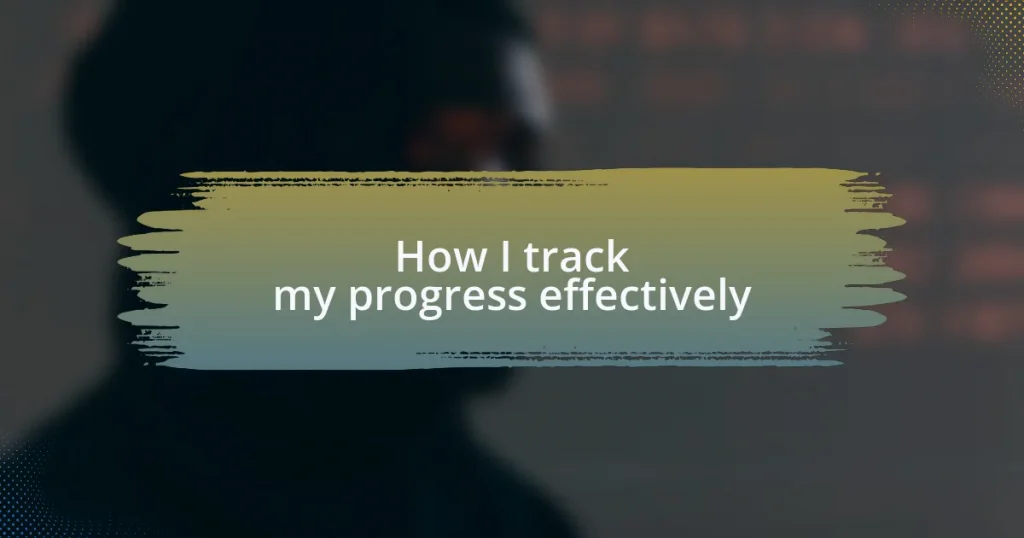Key takeaways:
- Progress tracking enhances accountability and reveals areas of growth in web development.
- Setting measurable goals transforms vague objectives into clear milestones, boosting motivation.
- Daily routines, including journaling and weekly reviews, improve focus and reflection on progress.
- Adjusting strategies based on feedback and results fosters continuous improvement and effective outcomes.
Author: Charlotte Everly
Bio: Charlotte Everly is an accomplished author known for her evocative storytelling and richly drawn characters. With a background in literature and creative writing, she weaves tales that explore the complexities of human relationships and the beauty of everyday life. Charlotte’s debut novel was met with critical acclaim, earning her a dedicated readership and multiple awards. When she isn’t penning her next bestseller, she enjoys hiking in the mountains and sipping coffee at her local café. She resides in Seattle with her two rescue dogs, Bella and Max.
Understanding progress tracking
When I first began tracking my progress in web development, I realized it was more than just marking tasks off a list; it was about understanding my learning journey. Each completed project reflected my growth, revealing the areas where I excelled and those needing improvement. Have you ever looked back and seen just how far you’ve come? It can be truly enlightening!
Progress tracking isn’t just about achievements; it’s about cultivating accountability. I remember a time when I set ambitious goals without a clear way to measure them. The feeling of being lost in an overwhelming sea of tasks sparked a desire in me to find a method that worked. Tracking my progress turned those vague objectives into clear milestones, allowing me to celebrate small victories along the way.
Beyond the metrics, there’s a personal element to progress tracking. I often find that sharing my journey with fellow developers boosts my motivation and creates a sense of community. When I open up about my challenges and successes, I not only hold myself accountable but also inspire others to join the conversation. Isn’t it powerful to think that our personal experiences can motivate not just ourselves, but those around us too?
Tools for tracking progress
Tools play a critical role in effectively tracking progress, especially in the fast-paced world of web development. I’ve experimented with various tools, and one that stands out for me is Trello. It’s not just a project management tool; each card I create serves as a visual reminder of my tasks and accomplishments. Have you ever felt overwhelmed by a project? With Trello, I can break my work down into manageable pieces, and checking off a completed task always brings a rush of satisfaction.
Another tool that’s incredibly useful is GitHub. Beyond just version control, it allows me to see my contributions over time. I often reflect on my commit history, which tells a story of growth and learning. Isn’t it fascinating how a simple log can reveal the time and effort put into each project? Tracking my activity in this way helps me understand my development pace and areas that need more attention.
I also can’t overlook the power of time-tracking applications like Toggl. Initially, I resisted the idea, thinking it might complicate my workflow. However, once I began using it, I found that it provided clarity on how I spent my hours. It was eye-opening to realize where I was productive and where I was getting sidetracked. Have you ever wished you had more hours in the day? Using Toggl taught me to allocate my time better, turning my focus toward activities that truly matter.
Setting measurable goals
Setting measurable goals is essential to track progress effectively. When I first started my journey in web development, I learned the importance of specificity. Instead of saying, “I want to improve my coding skills,” I shifted to, “I will complete three coding challenges on Codecademy each week.” This shift not only gave me a clear target but also made it easier to assess my progress after each week. Have you ever found that clarity helps reduce procrastination?
I remember a project where I set a goal to launch a personal website within a month. To measure my success, I broke it down into weekly milestones. Each milestone was accompanied by actionable items, like designing the homepage or writing content for my blog section. Reflecting on my journey, those specific, measurable goals kept my motivation levels high. Did you ever feel more accomplished when you achieved smaller goals toward a bigger project?
Additionally, celebrating small victories can be incredibly fulfilling. After completing my first milestone, I’d treat myself to a favorite snack or take a short break to recharge. This technique turned the goal-setting process into a more enjoyable experience. It made me realize how important it is to recognize progress, however small it may seem. How do you celebrate your achievements? For me, it’s about reinforcing positive behaviors and staying committed to my long-term vision.
Daily routines for effective tracking
Daily routines play a crucial role in tracking progress effectively. Personally, I start each day with a brief review of my goals and tasks. This simple ritual allows me to realign myself with what I aim to achieve, making me feel grounded and focused. Have you ever noticed how a quick morning check-in can set a positive tone for the day?
Another practice that has worked wonders for me is journaling my daily activities related to web development. At the end of each day, I jot down what I accomplished, the challenges I faced, and what I learned. This practice not only serves as a record of my progress but also helps me reflect on areas where I can improve. Can you think of how powerful it is to look back and see tangible evidence of your growth?
Lastly, I’ve found that incorporating a weekly review into my routine can be transformative. Every Sunday, I assess my weekly performance against my goals. I celebrate what went well and analyze what didn’t, which gives me a clearer perspective for the upcoming week. Reflecting on my experiences actively has helped me streamline my strategies and keep pushing forward. What strategies do you have in place to reflect on your week and recalibrate for success?
Analyzing your progress regularly
Analyzing your progress regularly is essential for gaining insights into your development journey. I remember a time when I felt stuck in a project without knowing why things weren’t clicking. After dedicating time each week to review my progress in detail, it became evident that I wasn’t allocating enough time for the learning phases of my projects. This realization had a profound impact on how I approached my work, as it allowed me to adjust my strategies in a more informed way.
I also find emotional resonance in the practice of setting aside time for self-reflection. Midway through a significant project, I took an afternoon to delve into my progress analysis, and it turned out to be a lightbulb moment. I uncovered not only my technical strengths but also my creative blocks. Recognizing both was key; it transformed my focus during coding sessions. Have you experienced a moment like that where reflecting on your journey opened new doors?
In terms of practical implementation, I’ve found that combining qualitative insights with quantitative metrics works wonders. Utilizing tools like time-tracking software, I can quantify how much time I dedicate to various tasks. This approach allows me to cross-reference my time investments with my output quality. By examining these data points regularly, I sharpen my skills progressively. So, how do you balance numbers and personal insights when evaluating your own progress?
Adjusting strategies based on results
Adjusting strategies based on results is where the magic truly happens. I recall a project where I spent weeks perfecting a feature, only to find out through feedback that it wasn’t serving user needs as intended. That experience taught me the value of iterating based on what I learned; now, I prioritize flexible strategies that can pivot in response to both my progress and user feedback.
I frequently re-evaluate my methods after significant milestones. A few months ago, while developing a new website, I reached a point where my initial plan no longer matched the project’s direction. By taking a step back and analyzing user interactions, I was able to shift my focus from aesthetics to usability, leading to a more effective end product. It’s amazing how sometimes the most significant adjustments come from listening closely to your results.
Moreover, I’ve learned that embracing a mindset of experimentation can be incredibly beneficial. Was there a time when a small tweak in your strategy brought about unexpected improvements? For instance, I once changed the way I approached debugging by testing one variable at a time instead of trying to fix everything at once. This shift not only simplified my process but also boosted my confidence, proving that minor adjustments can lead to major breakthroughs.















